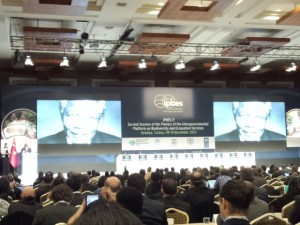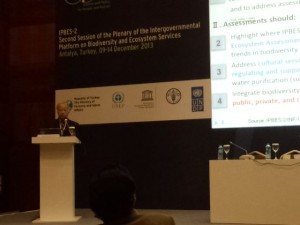 APN, represented by Dr. Akio Takemoto, Director of the Secretariat, participated as an acknowledged stakeholder in the second session of the Intergovernmental Platform on Biodiversity & Ecosystem Services (IPBES-2) from 9-11 December, and the preceding Stakeholder Consultation meeting on 7-8 December, in Antalya, Turkey.
APN, represented by Dr. Akio Takemoto, Director of the Secretariat, participated as an acknowledged stakeholder in the second session of the Intergovernmental Platform on Biodiversity & Ecosystem Services (IPBES-2) from 9-11 December, and the preceding Stakeholder Consultation meeting on 7-8 December, in Antalya, Turkey.
Established in April 2012 as a leading intergovernmental body for assessing the state of the planet’s biodiversity, its ecosystems and the essential services they provide to society, IPBES provides a mechanism to synthesise, review, assess and critically evaluate relevant information and knowledge generated worldwide by governments, academia, scientific organisations, non-governmental organisations and indigenous communities.
Member governments of IPBES agreed to set the four key functions of the Platform as: (1) knowledge generation, (2) assessment, (3) policy support tools, and (4) capacity building; with a view to fulfilling the following objectives:
- Strengthen capacity and knowledge foundations of the science-policy interface to implement IPBEs functions;
- Strengthen the science-policy interface on biodiversity and ecosystem services at and across the sub-regional, regional and global levels;
- Strengthen the knowledge-policy interface with regard to thematic and methodological issues; and
- Communicate and evaluate IPBES activities, deliverables and findings.
Key outcomes
The IPBES-2 adopted many important decisions to operationalise the Platform, including on the conceptual framework, initial work programme and budget 2014-2018, financial arrangements and procedures, rules and procedures for operation of the Platform, guidance on strategic partnerships, and stakeholder engagement and communication strategies.
The meeting agreed to develop a set of assessments aimed at providing policy makers with the tools to tackle pressing environmental challenges:
- The first assessment, to be available as early as December 2015, will look at pollination and food production.
- A second assessment will focus on the status of land degradation and restoration worldwide, as well as the effect this has on biodiversity, ecosystem services and human wellbeing.
- Over the next five years, the sub-regional, regional and global scale assessment and capacity building activities undertaken by IPBES will strengthen the science-policy interface at all levels.
The Platform will also support work on the integration of indigenous and local knowledge (ILK) in scientific processes, and on valuation and accounting of biodiversity and ecosystem services.
One of the strong needs of developing countries is capacity building, particularly scientific capacity development. It is urgent to enhance the capacity of researchers in developing countries so that they could produce academic papers and transform knowledge, including ILK, for policy makers within and outside their countries.
Member Governments demonstrated strong commitment to the implementation of the initial work programme, pledging more than half (US$ 25.4 million) of the total US$ 43.5 million required, US$ 7.5 million out of which are approved for the year 2014, including US$ 1.3 million for the Secretariat.
Dr. Anne Larigauderie, Head of Science in Society at the International Council for Science (ICSU) and former Executive Director of DIVERSITAS, was appointed as the incoming Executive Secretary of the IPBES Secretariat in Bonn, Germany.
Towards implementing of the IPBES Stakeholder Engagement Strategy
 On the first day of the Plenary (9 December), an event entitled “Towards implementing of the IPBES Stakeholder Engagement Strategy” was held.
On the first day of the Plenary (9 December), an event entitled “Towards implementing of the IPBES Stakeholder Engagement Strategy” was held.
Prof. Kazuhiko Takeuchi, Vice Rector of the United Nations University (UNU), introduced the outcome of the Asia-Pacific Workshop on Regional Interpretation of the IPBES.
The regional workshop, held from 2–4 September 2013 in Seoul, Republic of Korea, was co-organised by UNU Institute for Sustinability and Peace and Korea Environment Institute, and co-sponsored by APN and the Ministry of Environment of Republic of Korea.
Prof. Takeuchi introduced 12 key messages for developing the IPBES framework in regional and sub-regional context. The key messages are as follows:
- Actions on cross-cutting issues should
- Establish an IPBES Regional Hub to promote universal methods, policy coherence, regional collaboration, and address assessment shortfalls,
- Structure, content, and key questions for assessments should
- Highlight where IPBES can deliver advances beyond the Millennium Ecosystem Assessment framework, especially regarding status and trends in biodiversity,
- Address cultural services beyond recreation and tourism; and regulating and supporting services beyond climate regulation and water purification,
- Integrate biodiversity and ecosystem services co-management across private, and civil society sectors,
- Capacity building actions should
- Facilitate common data set and sharing of knowledge to track changes over time,
- Address most commonly identified capacity building needs – improved practitioner skills for ecosystem assessment and methods for integrating cross-scale stakeholder knowledge and priorities,
- Knowledge generation actions should
- Expand scope to cover gaps in Western Asia, Polynesia, and Eastern Asia sub-regions,
- Address gaps in assessments on urban and dry land ecosystems,
- Create advanced knowledge systems across scales and institutional levels through the integration of social science, citizen, private sector, indigenous and local knowledge,
- Policy-relevant tools and methodologies should
- Develop scientific methodologies for trade-off resolution that engage cross-scale, non-elite stakeholders,
- Develop verifiable criteria for holistic policy impact monitoring and reporting,
- Provide communications assistance for policy support tools.
By: Dr. Akio Takemoto. Director, APN Secretariat